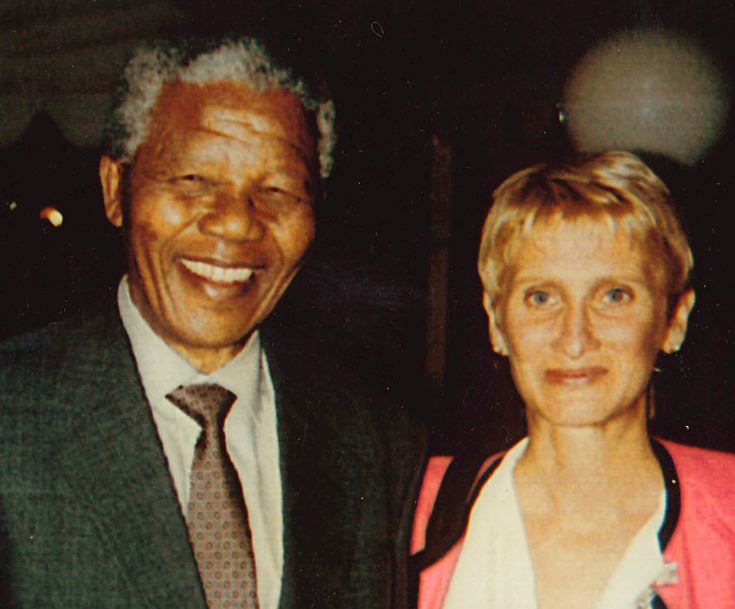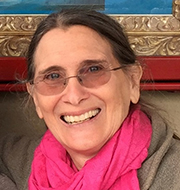 At the start of my most recent interview I was asked, “who are you and what’s your why?” It was no surprise as the host, Muriel Favarger Ripert, CEO of @ma Table & Co and founder of Fondation aaa, both of which create intergeneration links among individuals, organizations and businesses, is guided by the fundamental principle that every human being has inherent dignity and equal worth.
At the start of my most recent interview I was asked, “who are you and what’s your why?” It was no surprise as the host, Muriel Favarger Ripert, CEO of @ma Table & Co and founder of Fondation aaa, both of which create intergeneration links among individuals, organizations and businesses, is guided by the fundamental principle that every human being has inherent dignity and equal worth.
My immediate reply: “I am a connector!” You can watch the interview here.
Muriel also is a connector and it was through our kindred spirit of following the South African concept of Ubuntu, I am a human being through my relationships with other human beings, that we came to respect each other. We talked about the book I’m writing, The Urgency of Connectedness, with a foreword by Nobel Peace Laureate Archbishop Emeritus Desmond Tutu, an Ubuntu champion.
This made me think of a moment in the early 1970s sitting on a desert mesa and, when I looked at a bent twig sticking out of the ground, I thought “everything is connected to everything.” No, I wasn’t high. I was experiencing something that I’ve always felt since as long as I have conscious memory.
It’s why I love William Blake’s poem Auguries of Innocence that opens with, “To see a World in a Grain of Sand, And a Heaven in a Wild Flower, Hold Infinity in the palm of your hand, And Eternity in an hour.” And, why I feel a profound resonance with the heart of Ubuntu.
And, why, at a young age, I was drawn to Martin Buber’s “I/Thou” philosophy and Dr. Martin Luther King Jr’s “Beloved Community.” I’ve written, made keynote presentations, given a TEDx, and consulted on “connectedness” for decades. It’s at the heart of everything I do, personally and professionally.
Connectedness has been the golden thread that ties together the many disparate things I’ve done over seven decades. And, yet it hasn’t just been a clarion call that I could simply follow. It’s been a challenge for me at every stage of my life. I still have moments where I feel, “leave me alone, don’t ask me to talk to anyone.” You could charitably say, I just need “me” time to recharge. That would be true…to some extent.
But, if I’m honest, there’s a deeper resistance not only to connecting to others but even to connecting to myself. Often, I just want to be distracted by busyness. So, while I’ve done a great deal of self-reflection, by no means is my journey towards “being connected” – externally and internally – ended; it likely never will be.
I often say that I wouldn’t wish my pain on my worst enemy and, yet, I know that facing it has made me who I am: a far more compassionate, multi-faceted human being with empathy for others. When I went through a particularly difficult phase of “recovery” (which, of course, will continue to be a lifelong journey as there’s always more richness to uncover), one of my favorite books was, Strong at the Broken Places.
I marvel at how survivors of horrific acts – like Eli Wiesel who suffered the camps of the Holocaust or Waris Dirie who endured female genital mutilation – speak out against such crimes and become fierce advocates to assure that no one else anywhere will suffer. Or how Israeli and Palestinians whose family members were killed by enemy combatants work together in the Parents Circle for peace and reconciliation.
They choose restorative vs. retributive justice, which is not an easy path. It’s an arduous effort and, yet, one which they say makes them feel more human. Revenge is an unending cycle. Nelson Mandela understood this, when after 27 years of brutal imprisonment, he chose to unite his nation by actively engaging with the very perpetrators of a brutal oppression.
There may have been a time when each of them wanted to lash out and hurt others. I desired bloodthirsty vengeance at one stage of my sojoun. At that time, I saw Diana Riggs perform Medea and, at its completion as she was graphically surrounded by the blood of her children, I thought, “Is that all?”
At some point, I realized that the rage boiling inside of me wasn’t hurting anyone but me. I could neither keep it buried, compartmentalized nor could I surgically remove it (believe me, if there’d been a magic way to dispel it, gladly I would’ve). Instead, I had to own and express it in order to release it.
Now, I’m not talking “release” as in the myriad simplistic self-help books that have some version of, “hold it in your hands like a bunch of balloons and just let go.” I’d think when I’d read such literature, “Ha, ha, probably the worst thing that ever happened to you is that your mother didn’t cut the crust off your sandwiches,” smug in the assurance that my suffering was far worse.
I just reached a point where I released that my rage against those who’d hurt me (not that it can’t creep up in real time even today decades later; as, I said, this is a life-time’s work-in-progress); but, it’s no longer my demonic driver. And, I too make a choice to go for restorative vs. retributive justice.
We all yearn for connection to others. And, yet, we all have our dark inner shadows – often based on some prior hurt inflicted by others against us – that makes us fearful of truly opening up to another. As the great Brené Brown teaches, it’s within that very vulnerability that we find our greatest strength.
She says, “We can choose courage or we can choose comfort, but we can’t have both. Not at the same time. Vulnerability is not winning or losing; it’s having the courage to show up and be seen when we have no control over the outcome. Vulnerability is not weakness; it’s our greatest measure of courage.”
So, what do you have to do to find the courage to look inside, embrace your vulnerability and then reach out to others from that authentic, grounded, place of wholeness? I suggest it’s worth spending a bit of time reflecting on that now, especially during COVID when everyone’s feeling a bit more vulnerable.
I hope you’ll share in comments what you find. We all learn from each other. Find the place where you connect to yourself and then can genuinely connect to others. Have a great journey!
———-
You can watch video of interview. Nadine B Hack is CEO beCause Global Consulting and Senior Advisor Global Citizens Circle. She frequently gives keynote addresses globally. She also trains individuals and teams.

